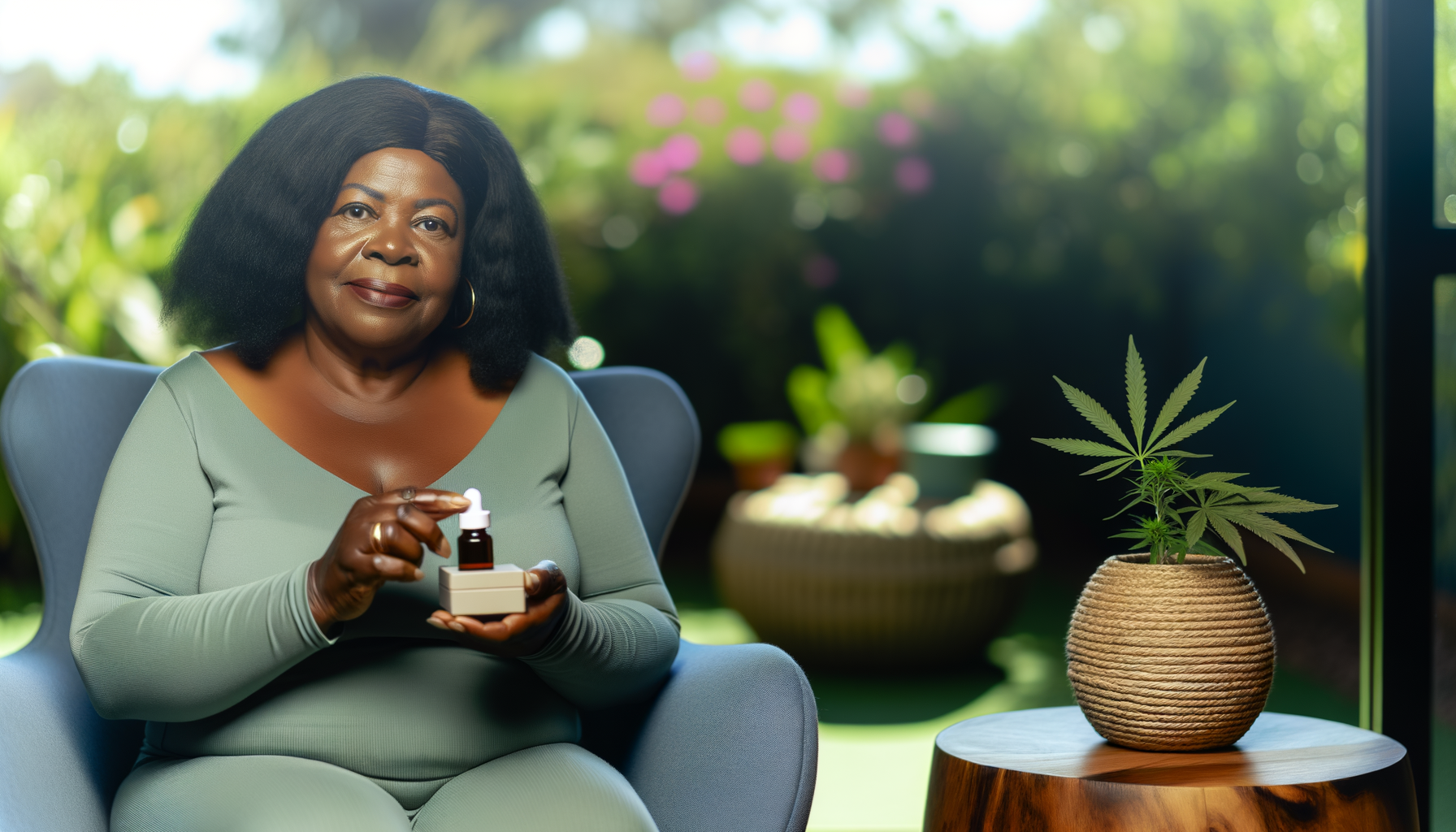Introduction to Menopause and Cannabis
Overview of Menopause Symptoms
Menopause marks a significant transition in a woman’s life, typically occurring in the late 40s to early 50s. It is characterized by the cessation of menstruation and a decline in the production of hormones such as estrogen and progesterone. This hormonal shift can lead to a variety of symptoms, including hot flashes, night sweats, mood swings, sleep disturbances, vaginal dryness, and decreased libido. These symptoms can significantly impact the quality of life and last for several years.
Traditional Treatments and Their Limitations
Traditional treatments for menopause symptoms have primarily focused on hormone replacement therapy (HRT), which can effectively alleviate symptoms for many women. However, HRT is not suitable for everyone and has been associated with potential risks, including increased chances of breast cancer and cardiovascular disease. Non-hormonal prescription medications and lifestyle changes are also recommended, but they may not provide relief for all women, leading some to seek alternative therapies.
Cannabis as an Alternative Approach
Cannabis, also known as marijuana, has emerged as a potential alternative approach for managing menopause symptoms. With its various strains and forms, such as THC (tetrahydrocannabinol) and CBD (cannabidiol), cannabis is being used by some women to address issues like sleep disturbances, mood changes, and joint pain. Anecdotal evidence suggests that cannabis may offer relief without the risks associated with traditional hormone therapies, though scientific research is still in its infancy.
Objective of the Article
The objective of this article is to explore the potential of cannabis as a treatment for menopause symptoms. We will delve into the historical and cultural context of cannabis use, examine its safety profile compared to traditional treatments, and review scientific research on its effectiveness. Additionally, we will discuss the legal considerations surrounding cannabis use for menopause relief. By weighing the prospects and acknowledging the need for more research, this article aims to provide a comprehensive overview of cannabis as a possible alternative for menopause symptom management.
Historical and Cultural Context of Cannabis Use
Cannabis in Indigenous Cultures
Cannabis has been intertwined with human culture for thousands of years, with evidence of its use dating back to ancient civilizations. Indigenous cultures across the globe have utilized cannabis for a variety of purposes, including medicinal, spiritual, and practical applications. The plant’s versatility and the psychoactive properties of certain compounds within it have made it a significant element in traditional practices and rituals.
- Medicinal Uses: Many indigenous cultures recognized the therapeutic potential of cannabis, employing it to treat ailments such as pain, inflammation, and gastrointestinal issues. Its use in traditional medicine often involved preparations from different parts of the plant, including leaves, seeds, and flowers.
- Spiritual Significance: In some cultures, cannabis was considered a sacred plant, believed to facilitate spiritual experiences and communication with the divine. It was often consumed during religious ceremonies or used as an offering to deities.
- Practical Applications: Beyond its psychoactive and medicinal properties, cannabis was also valued for its durable fibers, which were used to create textiles, ropes, and other materials essential for daily life.
Evolution of Cannabis Perception in Modern Medicine
The perception of cannabis in modern medicine has undergone significant changes over the past century. Initially, cannabis was included in Western pharmacopeias and used in various medicinal preparations. However, the early 20th century saw a shift towards prohibition and stigmatization, largely influenced by political and social factors. This led to a decline in medicinal cannabis use and research.
In recent decades, the discovery of the endocannabinoid system and the medicinal properties of cannabinoids like THC and CBD has sparked a resurgence of interest in cannabis as a therapeutic agent. Modern medicine now explores the potential of cannabis and its compounds in treating a range of conditions, from chronic pain to epilepsy, while grappling with the need for more comprehensive research and standardized regulations.
Current Legal Status and Accessibility
The legal status of cannabis varies widely around the world, with some countries embracing its medicinal use while others maintain strict prohibitions. In regions where medical cannabis is legal, patients can access various cannabis-based products, often with a prescription or under the guidance of a healthcare professional. The accessibility of these products is subject to regulatory frameworks that aim to ensure safety and control over distribution.
Despite the growing acceptance of medicinal cannabis in some areas, legal barriers continue to impact research and patient access. Advocates for medical cannabis call for evidence-based policies that recognize its therapeutic potential while addressing concerns related to misuse and public health.
Understanding the Safety of Cannabis for Menopause
Comparing Cannabis with Over-the-Counter Medicines
As women navigate the often challenging symptoms of menopause, many seek relief through various treatments, including over-the-counter (OTC) medications and alternative therapies. Cannabis has emerged as a potential alternative, with some studies suggesting that a significant number of women are turning to it for symptom relief. Unlike OTC medications, which are regulated by the FDA and come with specific dosing instructions and warnings, cannabis products are less standardized and can vary widely in potency and composition. This lack of regulation can make it difficult for consumers to make informed decisions about dosing and safety.
Importance of Dosage and Quality Control
Dosage is a critical factor when considering the safety of cannabis for menopause relief. Unlike traditional medications with recommended doses based on clinical trials, cannabis products often lack standardized dosing guidelines. This can lead to under-dosing, which may not provide the desired relief, or over-dosing, which can result in adverse effects. Quality control is another concern, as the cannabis industry’s regulatory landscape varies by region, and products may contain contaminants or inconsistent levels of active compounds. It is essential for consumers to source cannabis from reputable dispensaries that provide third-party lab testing results to ensure product safety and consistency.
Potential Side Effects and Risks
While cannabis may offer relief for menopause symptoms such as sleep disturbances and mood changes, it is not without potential side effects and risks. The psychoactive component of cannabis, THC, can cause cognitive impairment, dizziness, and altered judgment in some individuals. CBD, a non-psychoactive compound, is generally considered safe but can interact with certain medications. Long-term use of cannabis has not been extensively studied in the context of menopause, and the potential impacts on memory, lung function, and overall health remain unclear. Women considering cannabis for menopause relief should consult with a healthcare professional to weigh the potential benefits against the risks and to discuss any possible interactions with existing medications.
In conclusion, while cannabis may offer an alternative approach to managing menopause symptoms, it is crucial to approach its use with caution. Comparing it to OTC medicines highlights the need for more rigorous quality control and standardized dosing guidelines. Understanding the potential side effects and risks, as well as the importance of consulting with healthcare professionals, can help ensure that women make informed decisions about using cannabis for menopause relief.

Bette 100% All-Natural Relaxing Lavender Body Lotion.
Chemical-Free
Your relaxing night time body moisturizer to leave the day’s stress behind. Decompress and wish your body good night with the calming scent of lavender.
How Women Are Utilizing Cannabis for Menopause
Types of Cannabis Products Available
With the increasing acceptance and legalization of cannabis, a variety of products have become available to women seeking relief from menopause symptoms. The most common forms of cannabis used by menopausal women include smoked cannabis, edibles, and vaping oils. Each of these products offers a different mode of consumption and onset of effects, catering to personal preferences and specific needs. Smoked cannabis is noted for its quick onset, while edibles provide a longer-lasting effect, and vaping oils offer a discreet and controlled method of intake.
Personalizing Cannabis Use Based on Symptoms
Women are personalizing their cannabis use based on the menopause symptoms they experience. For instance, those suffering from sleep disturbances and anxiety may opt for products with a higher cannabidiol (CBD) content, known for its calming effects. Conversely, women dealing with muscle and joint pain might prefer products with a balanced ratio of CBD and tetrahydrocannabinol (THC) for their combined analgesic and anti-inflammatory properties. The choice of product and cannabinoid composition is often influenced by the symptom severity and the desired therapeutic outcome.
Case Studies and Anecdotal Evidence
Anecdotal evidence and case studies suggest that many women find cannabis effective for managing menopause-related symptoms. Surveys indicate that a significant percentage of women report improvements in mood, anxiety, and sleep quality after using cannabis. However, it is important to note that responses to cannabis can be highly individualized, and what works for one woman may not work for another. Additionally, while some women report minimal side effects, others may experience adverse reactions, underscoring the importance of starting with low doses and monitoring individual responses.
In conclusion, as cannabis becomes more accessible, women are increasingly turning to it as a potential source of relief from menopause symptoms. The variety of cannabis products available allows for personalized treatment approaches, although the choice should be made cautiously, considering the potential risks and the current lack of comprehensive research on long-term effects. Anecdotal evidence provides a basis for optimism, but further scientific studies are essential to fully understand the efficacy and safety of cannabis for menopause symptom management.
Scientific Research on Cannabis and Menopause Symptoms
Studies on PTSD and Menopause Symptom Overlap
Research has begun to draw parallels between the symptoms experienced by individuals with post-traumatic stress disorder (PTSD) and those undergoing menopause. Notably, a subset of female veterans reported that cannabidiol (CBD) products provided relief from PTSD-related anxiety and insomnia. This anecdotal evidence has led to a broader application of CBD for similar menopause-related symptoms such as irritability and sleep disturbances. The overlap in symptomatology suggests a potential therapeutic role for cannabis in managing menopause symptoms, although the exact mechanisms remain to be fully elucidated.
Effectiveness of CBD for Specific Menopause Symptoms
While the use of cannabis, particularly CBD, has been reported to alleviate a range of menopause symptoms, scientific studies specifically targeting this demographic are sparse. Anecdotal evidence and self-reported surveys indicate that CBD may be effective in managing headaches, mood fluctuations, and sleep issues associated with hormonal changes during menopause. However, the lack of controlled clinical trials means that these findings should be interpreted with caution. The subjective nature of symptom relief reported by users underscores the need for objective research to validate the efficacy of CBD for menopause symptoms.
Gaps in Current Research and Future Directions
The current body of research on cannabis and menopause is limited by several factors. Most studies to date have relied on self-reporting, which can introduce bias and does not establish causality. There is a pressing need for randomized controlled trials to assess the safety and effectiveness of cannabis, particularly long-term effects on cognitive function, bone density, and cardiovascular health. Future research should also explore the impact of different cannabis strains, dosages, and delivery methods on menopause symptoms. Additionally, understanding the role of the endocannabinoid system in menopause could open new avenues for targeted therapies. As the legal landscape around cannabis use continues to evolve, it is imperative that scientific inquiry keeps pace to inform safe and evidence-based recommendations for women considering cannabis for menopause relief.

Popular Read
Legal Considerations and State Regulations
Variations in Cannabis Legality Across States
The legal landscape of cannabis use in the United States is a patchwork of varying state laws and regulations. As of the latest updates, 23 states along with Washington, DC, and two U.S. territories have legalized marijuana for recreational use for adults aged 21 and older. Additionally, 38 states have legalized medical-use marijuana, with each state having its own list of qualifying conditions and regulations. This variation means that the legality of using cannabis for menopause symptoms can differ significantly depending on where a woman resides.
Understanding CBD Concentration Restrictions
While CBD (cannabidiol) is legal at the federal level, states have the authority to impose their own restrictions. Some states allow full use of CBD regardless of THC content, while others have strict limits on the concentration of THC permissible in CBD products. For instance, states like Alabama, Georgia, and Kentucky permit CBD use but restrict the THC concentration to a very low percentage, often less than 0.3%. It is crucial for consumers to be aware of their state’s specific regulations to ensure they are not inadvertently violating the law.
Navigating Legal Use of Cannabis for Menopause
For women considering cannabis to manage menopause symptoms, navigating the legal use of cannabis can be complex. It is essential to check the current laws in your state regarding cannabis use. In states where medical cannabis is legal, obtaining a doctor’s recommendation and a medical marijuana card may be necessary. In states with legalized recreational use, purchasing cannabis from a licensed dispensary is typically allowed without a medical card. However, it is important to note that even in states with legal cannabis, there may be restrictions on where it can be consumed, how much can be purchased, and how it can be transported.
Moreover, the legal status of cannabis is subject to change as legislation evolves. Therefore, staying informed about the latest developments in state laws and federal regulations is imperative. Women seeking relief from menopause symptoms through cannabis should also consider consulting with healthcare providers who are knowledgeable about the potential benefits and risks, as well as the legal aspects of cannabis use.
In conclusion, while cannabis may offer relief for menopause symptoms, it is surrounded by a complex web of legal considerations. Women must approach its use with caution and awareness, ensuring compliance with state regulations and seeking professional medical advice when necessary.
Conclusion: Weighing the Prospects of Cannabis for Menopause Relief
Summarizing the Potential Benefits
The exploration of cannabis as a therapeutic option for menopause symptoms has opened a new frontier in women’s health. With traditional hormone therapy presenting limitations and potential risks for some women, cannabis offers an alternative that may align better with individual preferences and medical profiles. The anecdotal and observational evidence suggests that cannabis, particularly in balanced THC:CBD forms, can provide relief from common menopausal disturbances such as mood swings, sleep disruptions, and anxiety. The safety profile of cannabis, as indicated by recent studies, shows promise with only a handful of moderate side effects reported, which are outweighed by the potential improvements in quality of life for menopausal women.
Acknowledging the Need for More Research
Despite the encouraging signs, the scientific community recognizes the need for more rigorous research. The current body of evidence, primarily derived from surveys and observational studies, lays the groundwork for future clinical trials. These trials should aim to elucidate the specific effects of cannabis on menopause-related symptoms, optimal dosing, long-term safety, and the impact of various cannabinoid profiles on efficacy. As the legal landscape continues to evolve, facilitating such research will be crucial for advancing our understanding and refining cannabis-based interventions for menopause.
Final Thoughts on Cannabis as a Menopause Treatment
In conclusion, while cannabis presents a beacon of hope for many seeking relief from menopause symptoms, the medical community must proceed with cautious optimism. The potential benefits of cannabis are clear, yet they must be weighed against the need for more conclusive evidence and an understanding of the long-term implications. As we stand on the cusp of potentially integrating cannabis into menopausal care, it is imperative that we prioritize patient safety, informed decision-making, and evidence-based practice. With a concerted effort from researchers, healthcare providers, and policymakers, cannabis may soon become a mainstay in the management of menopause, offering relief and comfort to those in transition.









